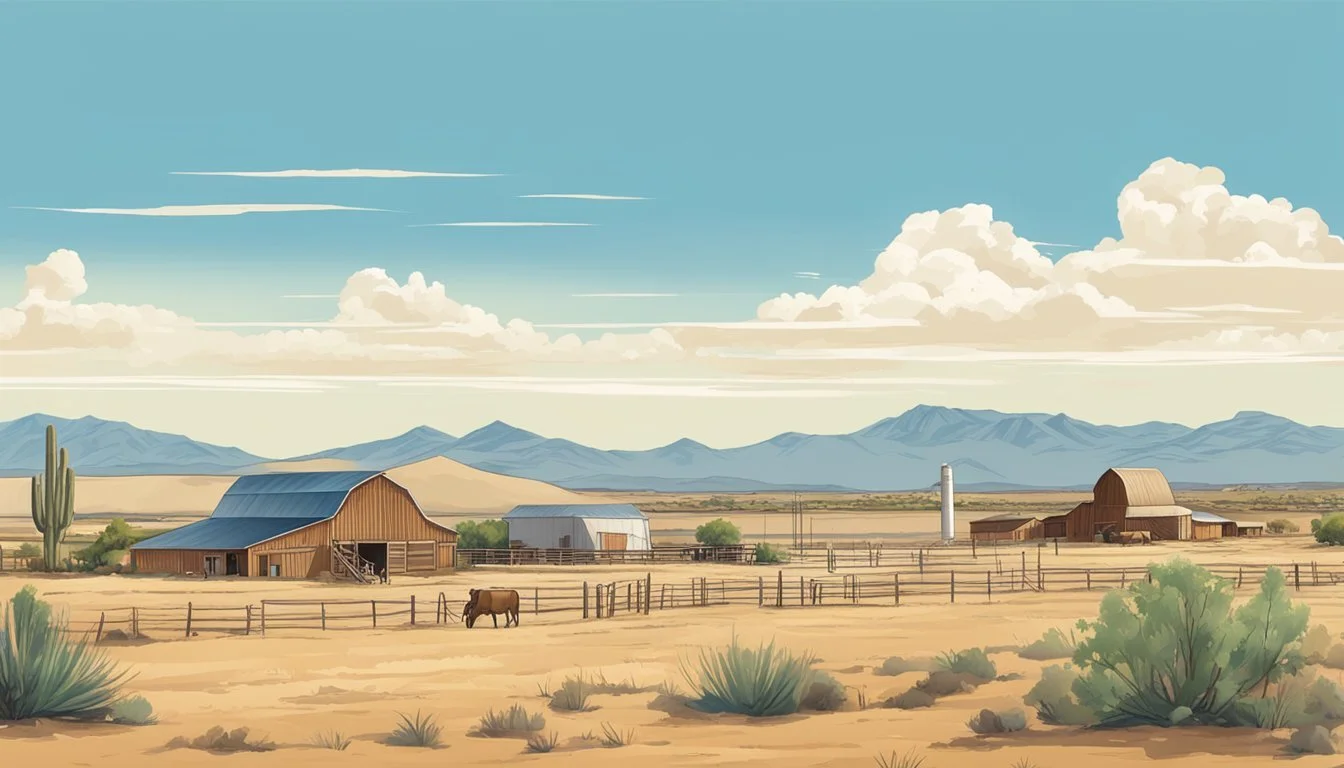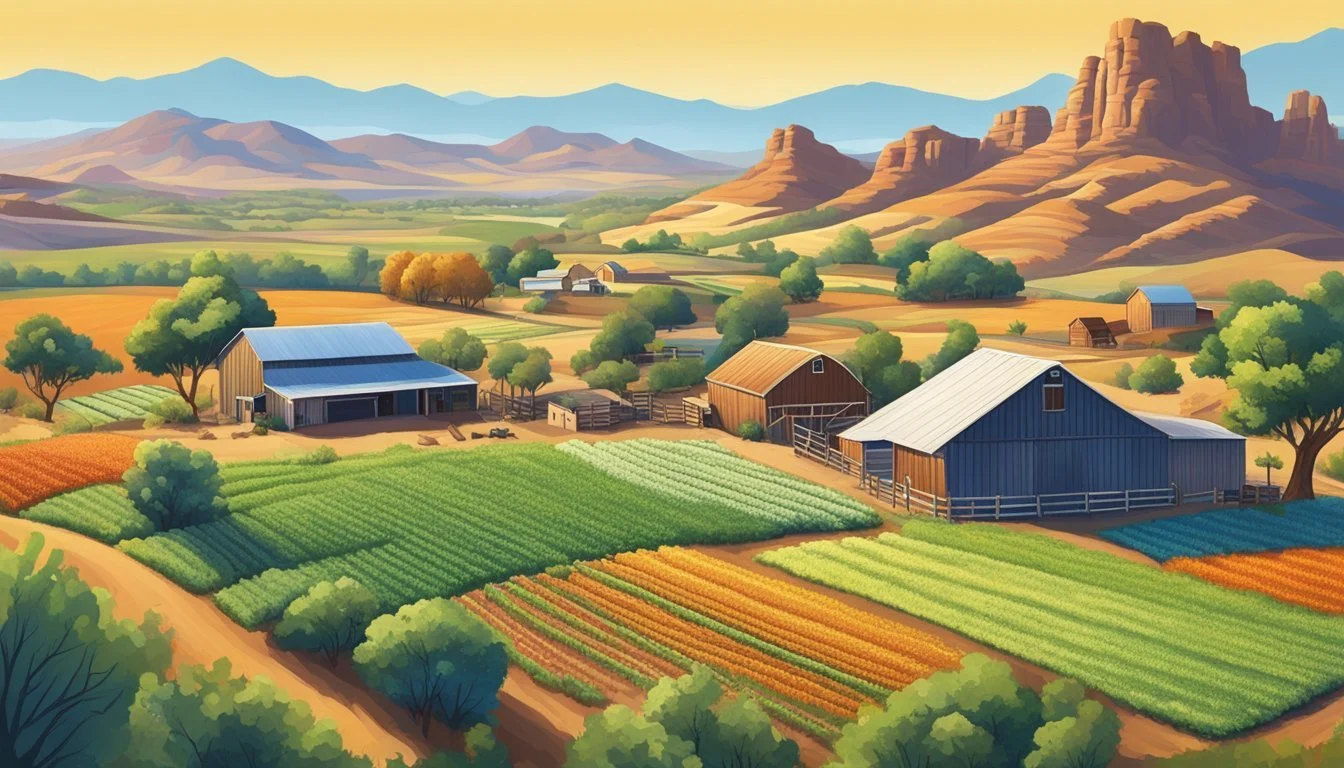Small Farms for Sale in Arizona
Your Guide to Finding the Perfect Acreage
This Article is Part of State-by-State Guide to Buying Your First Small Farm
Arizona's diverse landscape offers an appealing environment for small farm owners, marrying the state's agricultural heritage with the beauty of its rural expanses. Small farms in Arizona are a testament to the state's rich farming culture, which continues to thrive despite the burgeoning urban sprawl. The state's sunny climate, with its warm summers and mild winters, creates a conducive environment for a variety of crops and livestock. Small farms have become a staple in Arizona's agricultural sector, providing opportunities for local food production and sustainable agrarian lifestyles.
These parcels of land vary in size, generally ranging from modest acreages in rural counties like Apache, Cochise, and Yavapai to larger expanses in areas such as Greenlee County, offering diverse possibilities for potential farmers and homesteaders. The market for small farms in Arizona remains robust, with land available for various uses, be it crop cultivation, ranching, or even recreational farming. The state's agriculture is diverse, with farms often specializing in a range of products from traditional row crops to livestock and, increasingly, to niche markets like organic produce and agritourism.
Prospective buyers can find an array of options tailored to their agricultural aspirations, whether it's a desire for a self-sufficient homestead, a venture into the commercial market, or simply the pursuit of a rural lifestyle. The sales market reflects a commitment to the agrarian way of life, with farms available at different price points, ensuring accessibility for both seasoned farmers and those new to the field. The allure of owning a small farm in Arizona lies in the state's favorable farming conditions, combined with the entrepreneurial spirit that defines American agriculture.
Understanding the Small Farm Market in Arizona
The small farm market in Arizona encompasses a diverse range of properties, purpose-built for various agricultural activities; from hobby farms with residential homes to mini farms and farmettes, each offers unique opportunities for aspiring and current farmers.
Size and Scope
In Arizona, small farms typically encompass acreage tailored for small-scale operations. These properties can range significantly in size, from modest plots suitable for personal use to larger tracts of land that can support commercial endeavors. The price per acre averages around $6,815, with the overall listing price commonly found within the ballpark of $262,299.
Typical Farm Types and Uses
Small farms in Arizona serve a variety of purposes, often determined by their size and geographic location. They may include:
Hobby Farms: Ideal for those starting out or seeking a rural lifestyle.
Rural Mini Farms: Often used for small-scale agricultural or livestock activities.
Country Farmettes: Typically larger than hobby farms and can support more intensive farming.
Acreage for Specific Animals: Such as goats, sheep, or poultry.
These farms frequently include residential homes, making them suitable for owner-occupied farmers or those seeking a blend of country living with agricultural pursuits.
Economic Impact on Local Communities
The proliferation of small farms in Arizona has a tangible effect on local economies. They contribute by:
Providing Employment: Small farms can be a source of local jobs, both on the farm itself and through ancillary services.
Supporting Local Supply Chains: These farms often rely on local businesses for supplies, services, and for selling their products.
Arizona's small farm market plays an important role in maintaining the agricultural heritage and contributing to the diversity and resilience of rural communities throughout the state.
Types of Farms Available
In Arizona, prospective farm buyers will encounter a variety of agricultural properties catering to different farming practices and scales of operation.
Crop Production Farms
Crop production farms specialize in cultivating a wide range of fruits, vegetables, and grains due to Arizona's diverse climate and soil types. These farms vary in size and are spread across the state, with larger operations located in regions with suitable terrain and irrigation resources.
Livestock Farms
Livestock farms in Arizona are primarily geared towards the rearing of cattle, sheep, and goats. Smaller farms might focus on poultry or specialty livestock, often operating in areas like Cochise and Pima County with suitable acreage and facilities for animal husbandry.
Mixed-Use Farms
Mixed-use farms combine elements of both crop production and livestock rearing, offering versatility and the potential for diversified income streams. These farms take advantage of Arizona's varied landscape to allocate land optimally for both farming practices.
Hobby Farms
Ideal for enthusiasts or those seeking a rural lifestyle, hobby farms in Arizona can range from small acreages to larger estates. They often house a variety of small-scale agricultural activities and can be found with various amenities, such as residential structures and outbuildings for storage or workshops.
Factors Affecting Farm Value
The value of a farm in Arizona is influenced by several critical factors such as the quality of the land, water rights, and accessibility. Understanding these can provide insight into the farm's potential profitability and overall worth.
Land Quality and Farming Potential
The quality of the land is paramount in determining a farm's value. Farms with fertile soil and a conducive climate for agriculture often command higher prices. For example, a farm with 40 acres of arable land in Cochise County, with its semi-arid climate, can be desirable for certain crops and therefore more valuable than less fertile land of the same size.
Water Rights and Resources
Water rights are a critical factor in Arizona due to its arid environment. Farms with established water rights or access to irrigation systems can be significantly more valuable. The presence of wells, water shares, or proximity to water sources can dramatically influence the farm's operational capacity and, by extension, its value.
Accessibility and Proximity to Markets
Farm accessibility can affect its viability and value. A farm located near highways or with good road connections can reduce transportation costs and increase the speed of getting products to market, which is vital for perishable goods. Farms closer to urban centers or markets can also attract a higher value due to their reduced transit times and potential for direct sales to consumers.
Purchasing Process for Small Farms
When pursuing the purchase of a small farm in Arizona, buyers must carefully navigate finding the right property, understanding financial requirements, and complying with legal and regulatory frameworks.
Finding the Right Property
To find the appropriate property, prospective buyers should conduct comprehensive research, considering the farm's location, size, and soil suitability for the intended agricultural pursuits. Utilizing specialized real estate platforms listing properties in areas such as Cochise County and Santa Cruz County can vastly streamline the search. They should also determine whether the property has been designated for commercial farming, which may affect its utility and value.
Financial Considerations
Buyers should prepare a detailed financial plan that accounts for the purchase price, ongoing operational costs, and potential income. This may include properties listed at $51,300 for 4.75 acres in Santa Cruz County or $525,000 for 150 acres in Cochise County. Prospective buyers need to assess their budget and explore financing options, which can range from traditional bank loans to specialized agricultural loans that might provide more favorable terms for farming ventures.
Legal and Regulatory Compliance
Understanding and adhering to Arizona's agricultural laws is crucial. This involves zoning regulations, water rights, and environmental protections that govern small farm operations. Buyers should perform due diligence or consult with legal experts to ensure compliance with all relevant regulations prior to finalizing a farm purchase, mitigating the risk of future legal complications that could jeopardize their commercial farming operations.
Opportunities and Challenges
Investing in Arizona's small farm properties presents a blend of opportunities and challenges, primarily tied to sustainability and the integration of technology.
Sustainability and Organic Farming
Small farms in Arizona have a unique opportunity to capitalize on the growing demand for organic produce. By employing sustainable farming practices, they can differentiate themselves in the market and command higher prices. However, they face the challenge of climate adaptability, with Arizona's arid climate posing water scarcity issues, necessitating the need for innovative irrigation solutions and drought-resistant crops.
Innovation and Technology in Farming
The integration of technology in small-scale farming can significantly enhance productivity and management. Opportunities exist in the use of precision agriculture tools and data analysis to optimize resources and yields. Challenges include the costs associated with implementing such technologies and the need for digital literacy among farmers to effectively utilize these advancements.
Marketing and Sales Strategies
Effective marketing and sales strategies are critical in attracting potential buyers to small farms for sale in Arizona. They focus on showcasing the unique selling points of each property, reaching the right audience, and building relationships that can facilitate sales.
Direct-to-Consumer Methods
Direct-to-consumer (D2C) methods are a powerful way to engage potential buyers by offering them a personal connection to the farm. Sellers might host farm tours or participate in community-supported agriculture (CSA) programs to introduce consumers to the farm's products and lifestyle, creating a tangible experience that can be decisive in the sale process.
Online Advertising and Social Media
Using online platforms for advertising ensures a wide reach to a diverse audience. A strategic online presence, with well-curated content on platforms like Facebook, Instagram, and real estate websites, allows sellers to feature high-quality imagery and videos of their farm, detailed descriptions, and upcoming viewing schedules. Social media can be used to share stories of farm life, updates on farm operations, and special offers directly with followers.
Networking with Local Businesses
Collaboration with local businesses can help increase visibility among the community. Establishing connections with farm-to-table restaurants, local markets, and agricultural suppliers for cross-promotion gets the farm in front of individuals who value local produce and may consider investing in a farm themselves.
Working with Real Estate Agents
Real estate agents with experience in agricultural properties can be indispensable as they usually have a network of potential buyers and an understanding of the land's value. They can provide targeted marketing and are skilled at navigating the legalities and negotiations of selling a farm, which ensures a more reliable sales process.
Future Outlook for Small Farms in Arizona
Arizona's small farms face a future shaped by evolving agricultural practices, the ongoing impact of climate change, and opportunities for growth and expansion.
Trends in Agriculture
Technology and sustainability are increasingly important in Arizona's agricultural sector. Precision farming techniques are on the rise, employing data analytics and GPS-guided equipment to maximize productivity. Additionally, there is a growing trend toward organic farming in response to consumer demand for environmentally responsible and health-conscious products.
Impact of Climate Change
Climate change presents significant challenges for small farms in Arizona. Shifting weather patterns have led to frequent droughts and unpredictable rainfall. Farmers must adapt by investing in water-efficient irrigation systems and considering drought-resistant crop varieties. Mitigating these effects is crucial to ensuring the longevity of their farms.
Potential for Growth and Expansion
Economic indicators suggest a promising outlook for growth and expansion within Arizona's small farm sector. Consumer interest in locally-sourced food has sparked opportunities for small-scale producers. Furthermore, agrivoltaics—integrating solar panels with agriculture—provide an innovative way to maximize land use and generate additional revenue. Diversification into agritourism offers another avenue for growth, capitalizing on the scenic landscapes and unique agricultural experiences Arizona's farms provide.




